Report on Kenya's Market Economic System and Macro Objectives
VerifiedAdded on 2022/10/19
|7
|1329
|490
Report
AI Summary
This report provides an analysis of Kenya's market economic system, detailing its characteristics, advantages, and disadvantages. It examines government engagement in the market, discussing how individuals own resources. The report explores the benefits of a market economy, such as competition and innovation, and its drawbacks, including wealth disparity and environmental concerns. It also investigates the impact of macroeconomic objectives, such as sustainable development and employment, on companies like Econet Wireless, considering factors like price stability and international operations. The conclusion emphasizes the prevalence of mixed economic systems and the motivations provided by individual resource ownership.
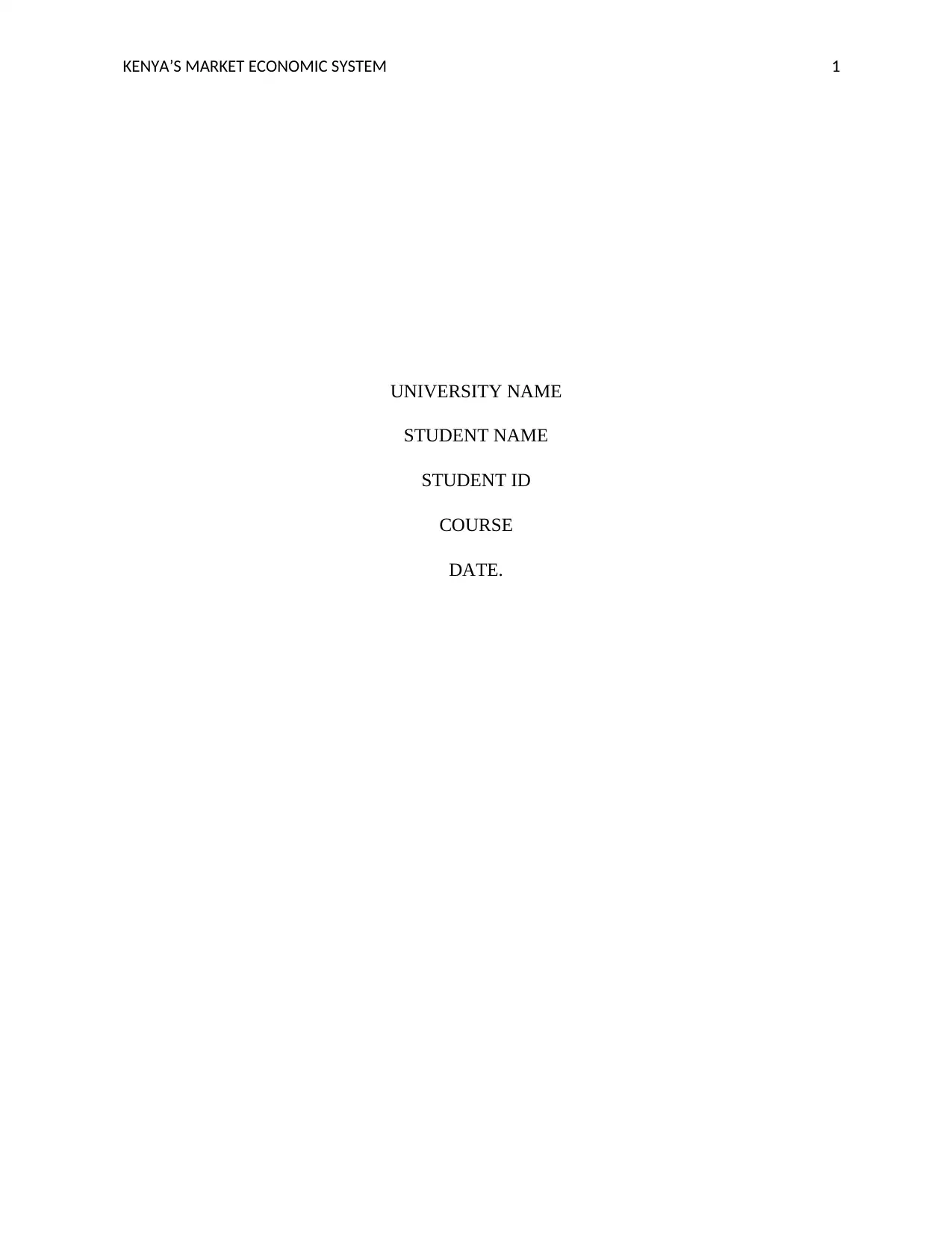
KENYA’S MARKET ECONOMIC SYSTEM 1
UNIVERSITY NAME
STUDENT NAME
STUDENT ID
COURSE
DATE.
UNIVERSITY NAME
STUDENT NAME
STUDENT ID
COURSE
DATE.
Paraphrase This Document
Need a fresh take? Get an instant paraphrase of this document with our AI Paraphraser
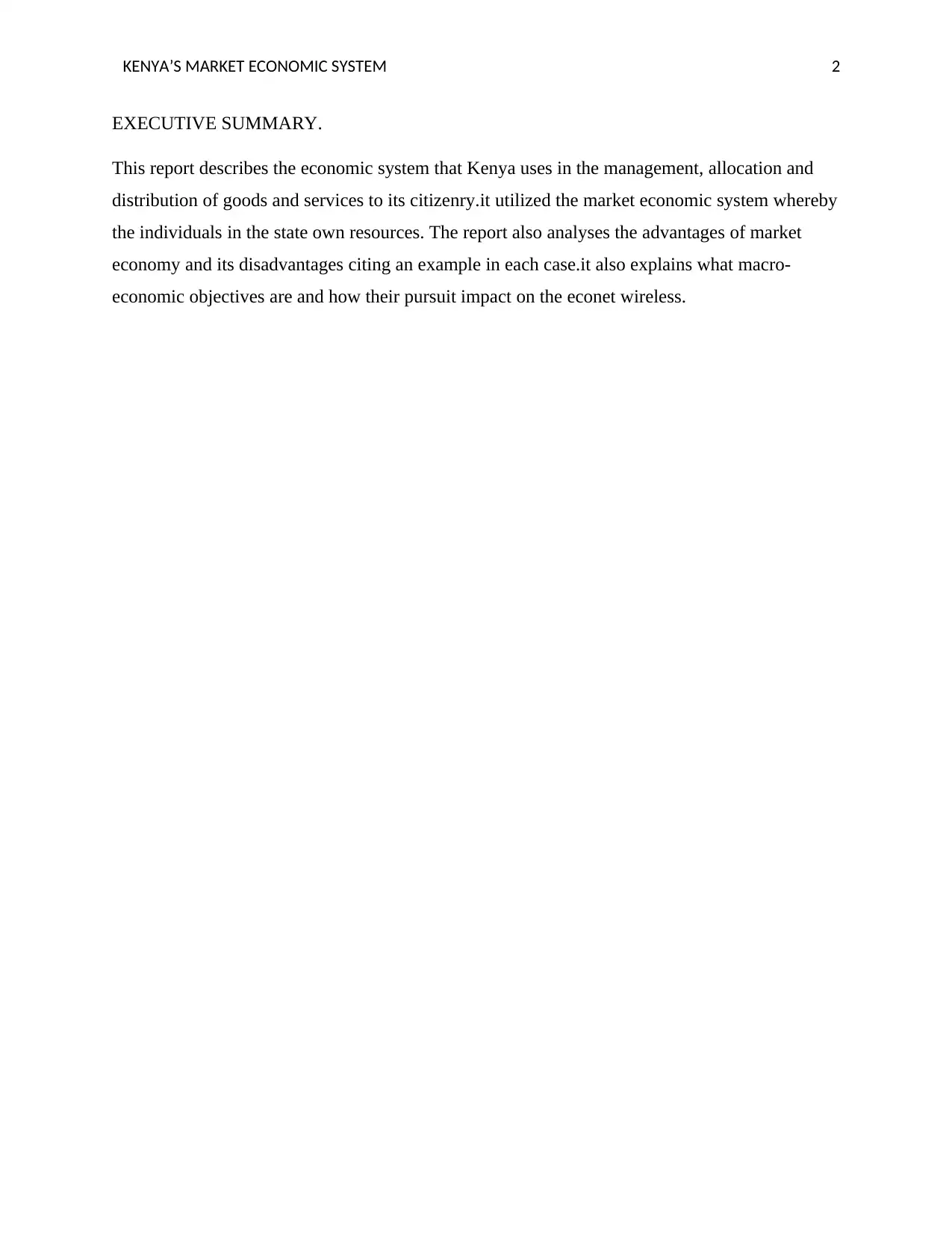
KENYA’S MARKET ECONOMIC SYSTEM 2
EXECUTIVE SUMMARY.
This report describes the economic system that Kenya uses in the management, allocation and
distribution of goods and services to its citizenry.it utilized the market economic system whereby
the individuals in the state own resources. The report also analyses the advantages of market
economy and its disadvantages citing an example in each case.it also explains what macro-
economic objectives are and how their pursuit impact on the econet wireless.
EXECUTIVE SUMMARY.
This report describes the economic system that Kenya uses in the management, allocation and
distribution of goods and services to its citizenry.it utilized the market economic system whereby
the individuals in the state own resources. The report also analyses the advantages of market
economy and its disadvantages citing an example in each case.it also explains what macro-
economic objectives are and how their pursuit impact on the econet wireless.
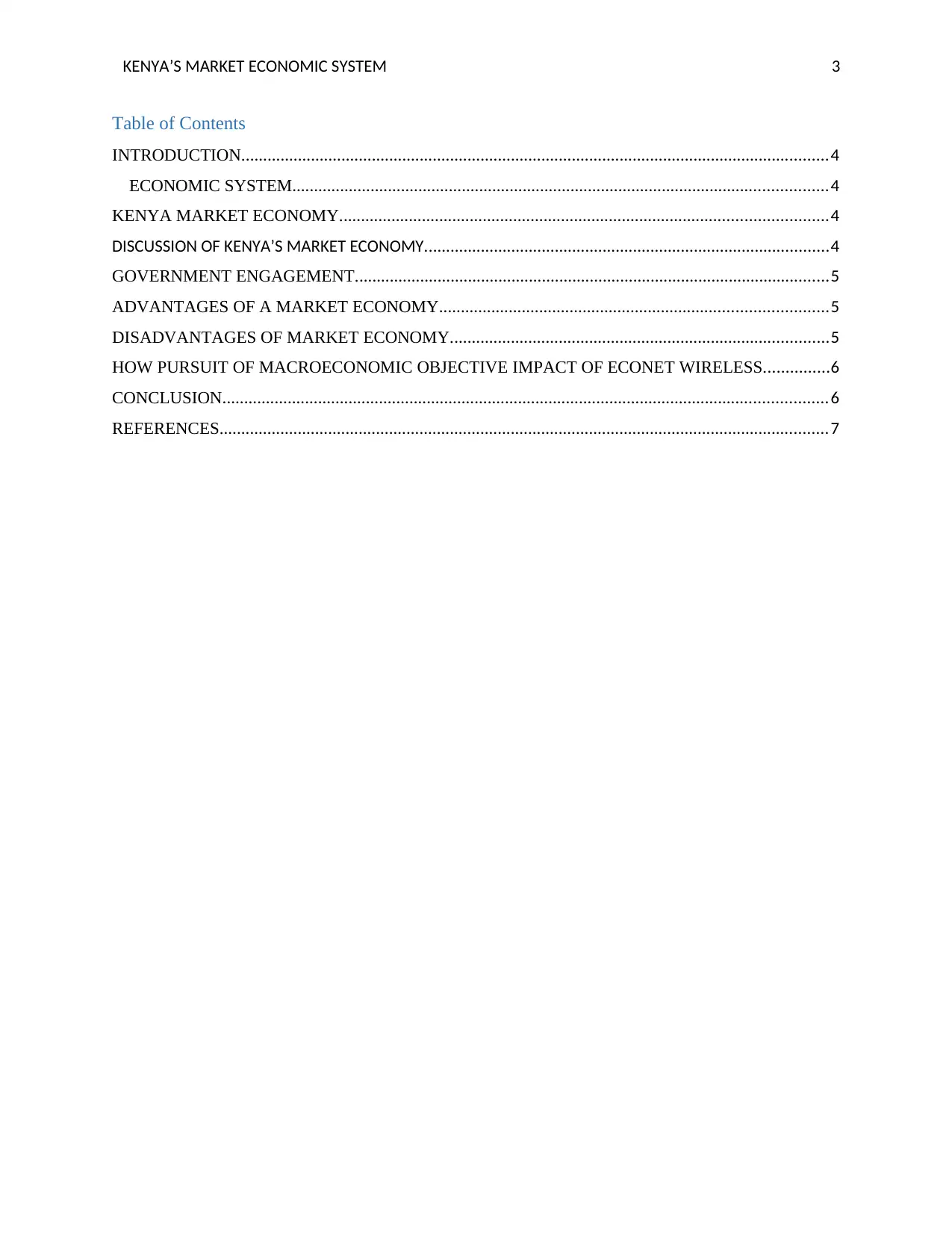
KENYA’S MARKET ECONOMIC SYSTEM 3
Table of Contents
INTRODUCTION.......................................................................................................................................4
ECONOMIC SYSTEM...........................................................................................................................4
KENYA MARKET ECONOMY................................................................................................................4
DISCUSSION OF KENYA’S MARKET ECONOMY.............................................................................................4
GOVERNMENT ENGAGEMENT.............................................................................................................5
ADVANTAGES OF A MARKET ECONOMY.........................................................................................5
DISADVANTAGES OF MARKET ECONOMY.......................................................................................5
HOW PURSUIT OF MACROECONOMIC OBJECTIVE IMPACT OF ECONET WIRELESS...............6
CONCLUSION...........................................................................................................................................6
REFERENCES............................................................................................................................................7
Table of Contents
INTRODUCTION.......................................................................................................................................4
ECONOMIC SYSTEM...........................................................................................................................4
KENYA MARKET ECONOMY................................................................................................................4
DISCUSSION OF KENYA’S MARKET ECONOMY.............................................................................................4
GOVERNMENT ENGAGEMENT.............................................................................................................5
ADVANTAGES OF A MARKET ECONOMY.........................................................................................5
DISADVANTAGES OF MARKET ECONOMY.......................................................................................5
HOW PURSUIT OF MACROECONOMIC OBJECTIVE IMPACT OF ECONET WIRELESS...............6
CONCLUSION...........................................................................................................................................6
REFERENCES............................................................................................................................................7
⊘ This is a preview!⊘
Do you want full access?
Subscribe today to unlock all pages.

Trusted by 1+ million students worldwide
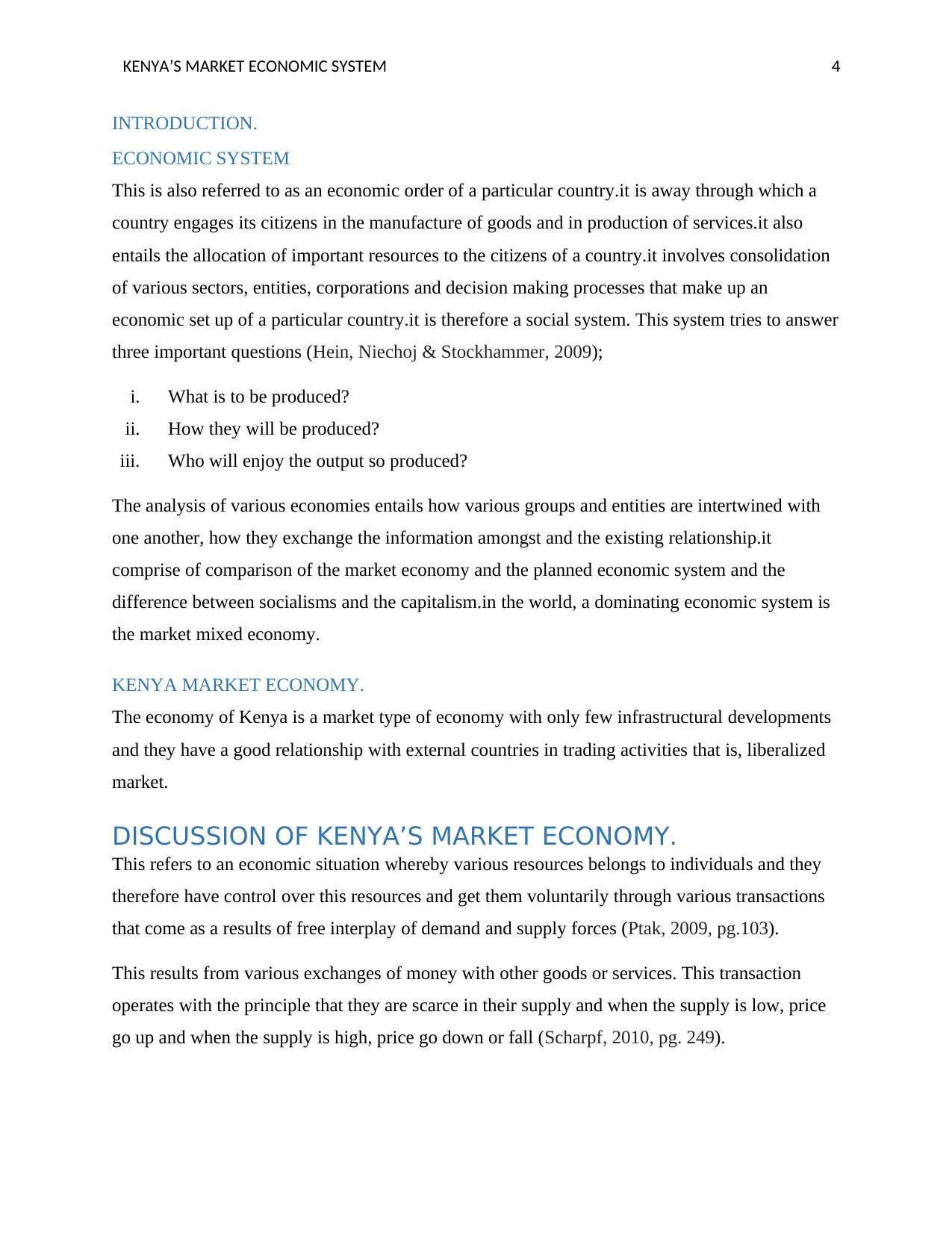
KENYA’S MARKET ECONOMIC SYSTEM 4
INTRODUCTION.
ECONOMIC SYSTEM
This is also referred to as an economic order of a particular country.it is away through which a
country engages its citizens in the manufacture of goods and in production of services.it also
entails the allocation of important resources to the citizens of a country.it involves consolidation
of various sectors, entities, corporations and decision making processes that make up an
economic set up of a particular country.it is therefore a social system. This system tries to answer
three important questions (Hein, Niechoj & Stockhammer, 2009);
i. What is to be produced?
ii. How they will be produced?
iii. Who will enjoy the output so produced?
The analysis of various economies entails how various groups and entities are intertwined with
one another, how they exchange the information amongst and the existing relationship.it
comprise of comparison of the market economy and the planned economic system and the
difference between socialisms and the capitalism.in the world, a dominating economic system is
the market mixed economy.
KENYA MARKET ECONOMY.
The economy of Kenya is a market type of economy with only few infrastructural developments
and they have a good relationship with external countries in trading activities that is, liberalized
market.
DISCUSSION OF KENYA’S MARKET ECONOMY.
This refers to an economic situation whereby various resources belongs to individuals and they
therefore have control over this resources and get them voluntarily through various transactions
that come as a results of free interplay of demand and supply forces (Ptak, 2009, pg.103).
This results from various exchanges of money with other goods or services. This transaction
operates with the principle that they are scarce in their supply and when the supply is low, price
go up and when the supply is high, price go down or fall (Scharpf, 2010, pg. 249).
INTRODUCTION.
ECONOMIC SYSTEM
This is also referred to as an economic order of a particular country.it is away through which a
country engages its citizens in the manufacture of goods and in production of services.it also
entails the allocation of important resources to the citizens of a country.it involves consolidation
of various sectors, entities, corporations and decision making processes that make up an
economic set up of a particular country.it is therefore a social system. This system tries to answer
three important questions (Hein, Niechoj & Stockhammer, 2009);
i. What is to be produced?
ii. How they will be produced?
iii. Who will enjoy the output so produced?
The analysis of various economies entails how various groups and entities are intertwined with
one another, how they exchange the information amongst and the existing relationship.it
comprise of comparison of the market economy and the planned economic system and the
difference between socialisms and the capitalism.in the world, a dominating economic system is
the market mixed economy.
KENYA MARKET ECONOMY.
The economy of Kenya is a market type of economy with only few infrastructural developments
and they have a good relationship with external countries in trading activities that is, liberalized
market.
DISCUSSION OF KENYA’S MARKET ECONOMY.
This refers to an economic situation whereby various resources belongs to individuals and they
therefore have control over this resources and get them voluntarily through various transactions
that come as a results of free interplay of demand and supply forces (Ptak, 2009, pg.103).
This results from various exchanges of money with other goods or services. This transaction
operates with the principle that they are scarce in their supply and when the supply is low, price
go up and when the supply is high, price go down or fall (Scharpf, 2010, pg. 249).
Paraphrase This Document
Need a fresh take? Get an instant paraphrase of this document with our AI Paraphraser
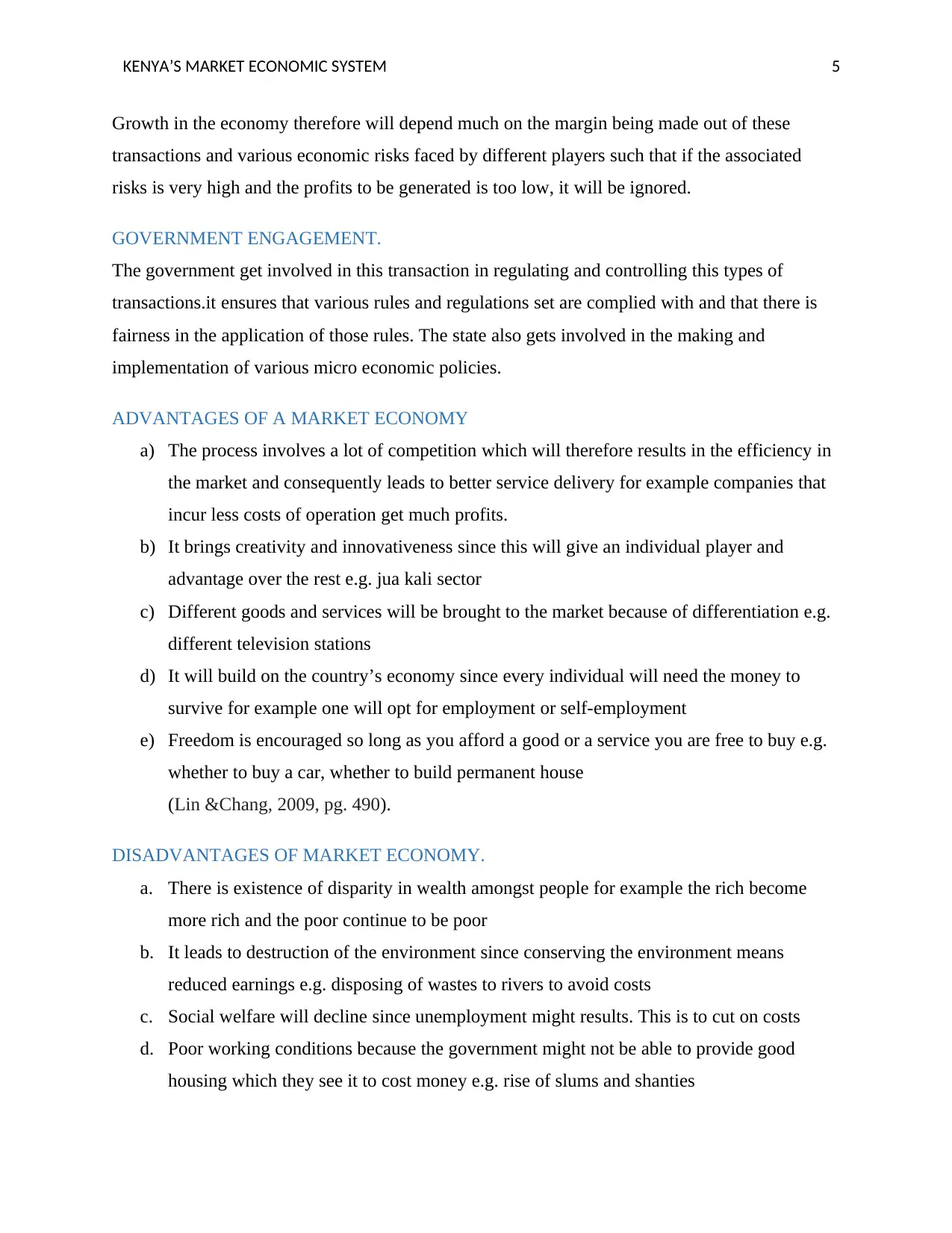
KENYA’S MARKET ECONOMIC SYSTEM 5
Growth in the economy therefore will depend much on the margin being made out of these
transactions and various economic risks faced by different players such that if the associated
risks is very high and the profits to be generated is too low, it will be ignored.
GOVERNMENT ENGAGEMENT.
The government get involved in this transaction in regulating and controlling this types of
transactions.it ensures that various rules and regulations set are complied with and that there is
fairness in the application of those rules. The state also gets involved in the making and
implementation of various micro economic policies.
ADVANTAGES OF A MARKET ECONOMY
a) The process involves a lot of competition which will therefore results in the efficiency in
the market and consequently leads to better service delivery for example companies that
incur less costs of operation get much profits.
b) It brings creativity and innovativeness since this will give an individual player and
advantage over the rest e.g. jua kali sector
c) Different goods and services will be brought to the market because of differentiation e.g.
different television stations
d) It will build on the country’s economy since every individual will need the money to
survive for example one will opt for employment or self-employment
e) Freedom is encouraged so long as you afford a good or a service you are free to buy e.g.
whether to buy a car, whether to build permanent house
(Lin &Chang, 2009, pg. 490).
DISADVANTAGES OF MARKET ECONOMY.
a. There is existence of disparity in wealth amongst people for example the rich become
more rich and the poor continue to be poor
b. It leads to destruction of the environment since conserving the environment means
reduced earnings e.g. disposing of wastes to rivers to avoid costs
c. Social welfare will decline since unemployment might results. This is to cut on costs
d. Poor working conditions because the government might not be able to provide good
housing which they see it to cost money e.g. rise of slums and shanties
Growth in the economy therefore will depend much on the margin being made out of these
transactions and various economic risks faced by different players such that if the associated
risks is very high and the profits to be generated is too low, it will be ignored.
GOVERNMENT ENGAGEMENT.
The government get involved in this transaction in regulating and controlling this types of
transactions.it ensures that various rules and regulations set are complied with and that there is
fairness in the application of those rules. The state also gets involved in the making and
implementation of various micro economic policies.
ADVANTAGES OF A MARKET ECONOMY
a) The process involves a lot of competition which will therefore results in the efficiency in
the market and consequently leads to better service delivery for example companies that
incur less costs of operation get much profits.
b) It brings creativity and innovativeness since this will give an individual player and
advantage over the rest e.g. jua kali sector
c) Different goods and services will be brought to the market because of differentiation e.g.
different television stations
d) It will build on the country’s economy since every individual will need the money to
survive for example one will opt for employment or self-employment
e) Freedom is encouraged so long as you afford a good or a service you are free to buy e.g.
whether to buy a car, whether to build permanent house
(Lin &Chang, 2009, pg. 490).
DISADVANTAGES OF MARKET ECONOMY.
a. There is existence of disparity in wealth amongst people for example the rich become
more rich and the poor continue to be poor
b. It leads to destruction of the environment since conserving the environment means
reduced earnings e.g. disposing of wastes to rivers to avoid costs
c. Social welfare will decline since unemployment might results. This is to cut on costs
d. Poor working conditions because the government might not be able to provide good
housing which they see it to cost money e.g. rise of slums and shanties
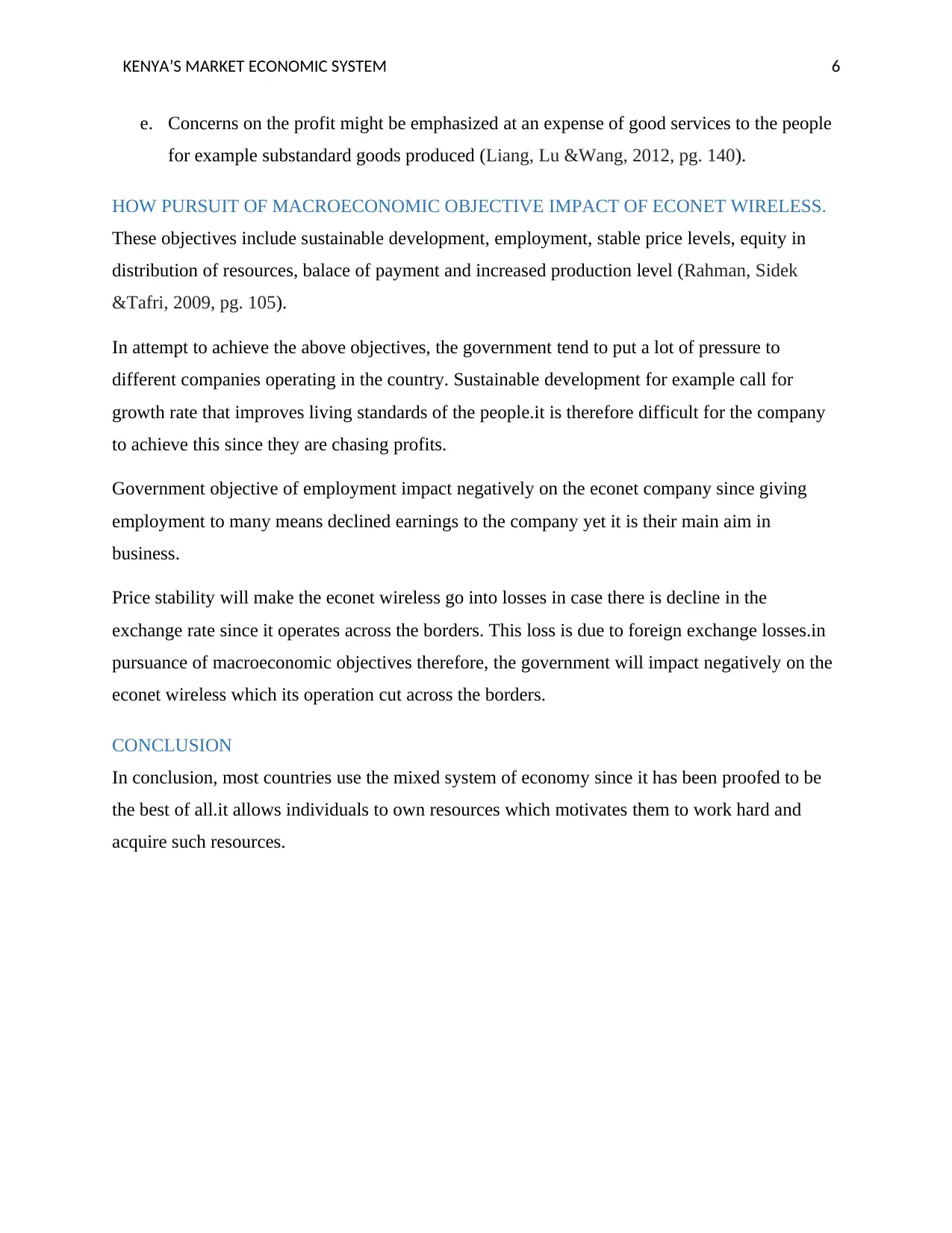
KENYA’S MARKET ECONOMIC SYSTEM 6
e. Concerns on the profit might be emphasized at an expense of good services to the people
for example substandard goods produced (Liang, Lu &Wang, 2012, pg. 140).
HOW PURSUIT OF MACROECONOMIC OBJECTIVE IMPACT OF ECONET WIRELESS.
These objectives include sustainable development, employment, stable price levels, equity in
distribution of resources, balace of payment and increased production level (Rahman, Sidek
&Tafri, 2009, pg. 105).
In attempt to achieve the above objectives, the government tend to put a lot of pressure to
different companies operating in the country. Sustainable development for example call for
growth rate that improves living standards of the people.it is therefore difficult for the company
to achieve this since they are chasing profits.
Government objective of employment impact negatively on the econet company since giving
employment to many means declined earnings to the company yet it is their main aim in
business.
Price stability will make the econet wireless go into losses in case there is decline in the
exchange rate since it operates across the borders. This loss is due to foreign exchange losses.in
pursuance of macroeconomic objectives therefore, the government will impact negatively on the
econet wireless which its operation cut across the borders.
CONCLUSION
In conclusion, most countries use the mixed system of economy since it has been proofed to be
the best of all.it allows individuals to own resources which motivates them to work hard and
acquire such resources.
e. Concerns on the profit might be emphasized at an expense of good services to the people
for example substandard goods produced (Liang, Lu &Wang, 2012, pg. 140).
HOW PURSUIT OF MACROECONOMIC OBJECTIVE IMPACT OF ECONET WIRELESS.
These objectives include sustainable development, employment, stable price levels, equity in
distribution of resources, balace of payment and increased production level (Rahman, Sidek
&Tafri, 2009, pg. 105).
In attempt to achieve the above objectives, the government tend to put a lot of pressure to
different companies operating in the country. Sustainable development for example call for
growth rate that improves living standards of the people.it is therefore difficult for the company
to achieve this since they are chasing profits.
Government objective of employment impact negatively on the econet company since giving
employment to many means declined earnings to the company yet it is their main aim in
business.
Price stability will make the econet wireless go into losses in case there is decline in the
exchange rate since it operates across the borders. This loss is due to foreign exchange losses.in
pursuance of macroeconomic objectives therefore, the government will impact negatively on the
econet wireless which its operation cut across the borders.
CONCLUSION
In conclusion, most countries use the mixed system of economy since it has been proofed to be
the best of all.it allows individuals to own resources which motivates them to work hard and
acquire such resources.
⊘ This is a preview!⊘
Do you want full access?
Subscribe today to unlock all pages.

Trusted by 1+ million students worldwide
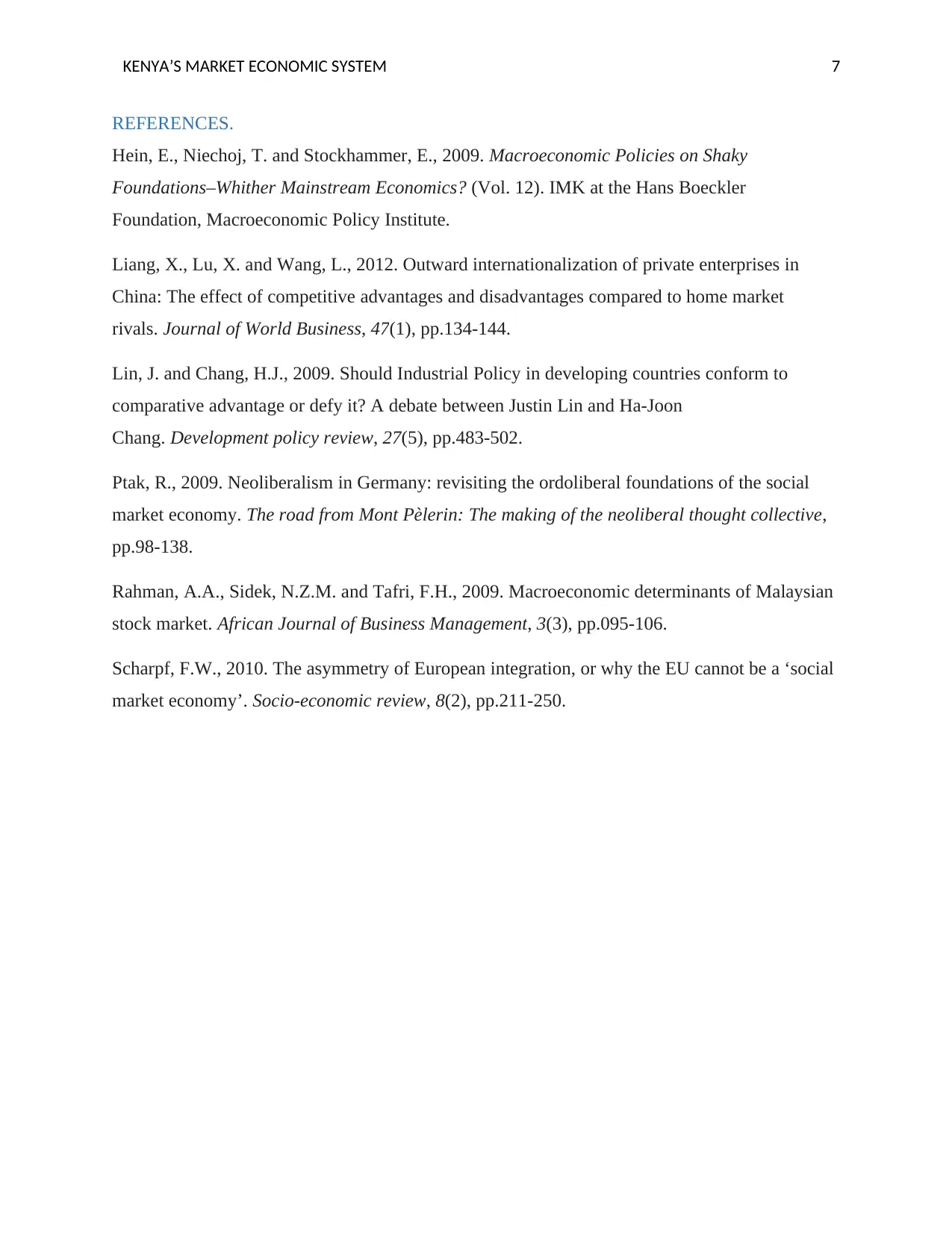
KENYA’S MARKET ECONOMIC SYSTEM 7
REFERENCES.
Hein, E., Niechoj, T. and Stockhammer, E., 2009. Macroeconomic Policies on Shaky
Foundations–Whither Mainstream Economics? (Vol. 12). IMK at the Hans Boeckler
Foundation, Macroeconomic Policy Institute.
Liang, X., Lu, X. and Wang, L., 2012. Outward internationalization of private enterprises in
China: The effect of competitive advantages and disadvantages compared to home market
rivals. Journal of World Business, 47(1), pp.134-144.
Lin, J. and Chang, H.J., 2009. Should Industrial Policy in developing countries conform to
comparative advantage or defy it? A debate between Justin Lin and Ha‐Joon
Chang. Development policy review, 27(5), pp.483-502.
Ptak, R., 2009. Neoliberalism in Germany: revisiting the ordoliberal foundations of the social
market economy. The road from Mont Pèlerin: The making of the neoliberal thought collective,
pp.98-138.
Rahman, A.A., Sidek, N.Z.M. and Tafri, F.H., 2009. Macroeconomic determinants of Malaysian
stock market. African Journal of Business Management, 3(3), pp.095-106.
Scharpf, F.W., 2010. The asymmetry of European integration, or why the EU cannot be a ‘social
market economy’. Socio-economic review, 8(2), pp.211-250.
REFERENCES.
Hein, E., Niechoj, T. and Stockhammer, E., 2009. Macroeconomic Policies on Shaky
Foundations–Whither Mainstream Economics? (Vol. 12). IMK at the Hans Boeckler
Foundation, Macroeconomic Policy Institute.
Liang, X., Lu, X. and Wang, L., 2012. Outward internationalization of private enterprises in
China: The effect of competitive advantages and disadvantages compared to home market
rivals. Journal of World Business, 47(1), pp.134-144.
Lin, J. and Chang, H.J., 2009. Should Industrial Policy in developing countries conform to
comparative advantage or defy it? A debate between Justin Lin and Ha‐Joon
Chang. Development policy review, 27(5), pp.483-502.
Ptak, R., 2009. Neoliberalism in Germany: revisiting the ordoliberal foundations of the social
market economy. The road from Mont Pèlerin: The making of the neoliberal thought collective,
pp.98-138.
Rahman, A.A., Sidek, N.Z.M. and Tafri, F.H., 2009. Macroeconomic determinants of Malaysian
stock market. African Journal of Business Management, 3(3), pp.095-106.
Scharpf, F.W., 2010. The asymmetry of European integration, or why the EU cannot be a ‘social
market economy’. Socio-economic review, 8(2), pp.211-250.
1 out of 7
Related Documents
Your All-in-One AI-Powered Toolkit for Academic Success.
+13062052269
info@desklib.com
Available 24*7 on WhatsApp / Email
![[object Object]](/_next/static/media/star-bottom.7253800d.svg)
Unlock your academic potential
Copyright © 2020–2026 A2Z Services. All Rights Reserved. Developed and managed by ZUCOL.




